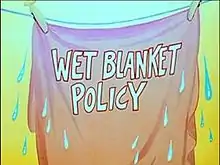Wet Blanket Policy
Wet Blanket Policy is the 30th animated cartoon short subject in the Woody Woodpecker series.[4] Released theatrically on August 27, 1948,[2][3] the film was produced by Walter Lantz Productions and distributed by Universal Pictures.[5] The title is a play-on-words about a type of insurance policy.
| Wet Blanket Policy | |
|---|---|
 | |
| Directed by | Dick Lundy |
| Produced by | Walter Lantz |
| Story by | Ben Hardaway Heck Allen |
| Starring | Lionel Stander Ben Hardaway |
| Music by | Darrell Calker Gloria Wood Harry Babbitt George Tibbles (unc.) Ramey Idriss (unc.) Kay Kyser (unc.) |
| Animation by | Les Kline Ken O'Brien Laverne Harding (unc.) Fred Moore (unc.) Ed Love (unc.) Pat Matthews (unc.) Sid Pillet (unc.)[1] |
| Backgrounds by | Fred Brunish |
| Color process | Technicolor |
Production company | |
| Distributed by | Universal Pictures |
Release date | |
Running time | 6 minutes |
| Language | English |
Plot
Confidence man Buzz Buzzard (Lionel Stander) is looking for a fresh sucker to swindle. Looking off in the distance, Buzz sees a happy-go-lucky Woody Woodpecker (Ben Hardaway), minding his own business while whistling down the street. The cunning buzzard quickly assembles a makeshift insurance office and greases the sidewalk, causing Woody to slide directly through the front door.
Buzz tries to convince Woody that he needs an insurance policy. Buzz tells Woody that "One never knows when a little accident might prove fatal." Woody is then bamboozled into signing a policy; with the fine print clearly stating that it will pay Buzz $10,000 in case of "accidental" death. However, Woody soon realizes what is going on and challenges him to try to carry out his plan, mocking him by saying "If you think you're going to bump ME off and collect $10,000...you're crazy! Anytime you can get $10,000 from me, it'll be over my dead body, you dirty crook!"
Buzz then tries his best to kill Woody so he can collect, resulting in a battle of wits between them, only to have the tables turned on him when Woody knocks him into a pit full of alligators. As Buzz flees from his attackers (Woody and the gators), screaming into the distance, Woody laughs and tears up the policy.
"The Woody Woodpecker Song" and Buzz Buzzard
Wet Blanket Policy is notable for several debuts. First, the film was the first appearance of Woody Woodpecker's theme song, "The Woody Woodpecker Song." Written by George Tibbles and Ramey Idriss, the song was performed by Kay Kyser, with Gloria Wood providing vocals and Harry Babbitt chiming in with Woody's trademark laugh. The song was a smash hit, selling over 250,000 records within ten days of its release. Cashing in on the unexpected popularity, Walter Lantz hastily inserted the tune into Wet Blanket Policy, his latest film in production as the time (which explains why the action and music do not match up for the first minute of the film). As a result of including "The Woody Woodpecker Song" in Wet Blanket Policy, the song became the first and only tune from an animated short subject to be nominated for the Academy Award for Best Original Song.[6] Lantz adopted the song as Woody's theme music from then on.
Secondly, Wet Blanket Policy prominently featured Woody's new adversary, Buzz Buzzard. Buzz proved to be a more popular foil for Woody than Wally Walrus, who appeared less frequently in Woody cartoons after this film. Buzz would appear with the famous woodpecker steadily until 1955's Bunco Busters, when he was replaced by Dapper Denver Dooley. Dooley would stay on board until 1959's The Tee Bird; Buzz would only reappear ten years after Dooley's final appearance, in 1969's Tumble Weed Greed.
Lionel Stander provided the voice of Buzz Buzzard for his earliest appearances. When Stander was blacklisted in 1951, Dal McKennon stepped in as Buzz as well as Wally and Dooley.
References
- ""Wet Blanket Policy" (1948) |". cartoonresearch.com. Retrieved 27 June 2020.
- "The Vault". www2.boxoffice.com. Retrieved 15 June 2020.
- Cooke, Jon, Komorowski, Thad, Shakarian, Pietro, and Tatay, Jack. "1948". The Walter Lantz Cartune Encyclopedia.
- Lenburg, Jeff (1999). The Encyclopedia of Animated Cartoons. Checkmark Books. pp. 157–158. ISBN 0-8160-3831-7.
- "THE 21ST ACADEMY AWARDS - 1949". Oscars.org. Academy of Motion Picture Arts & Sciences. Retrieved 16 September 2018.
External links
| Wikiquote has quotations related to: Woody Woodpecker (film) |
